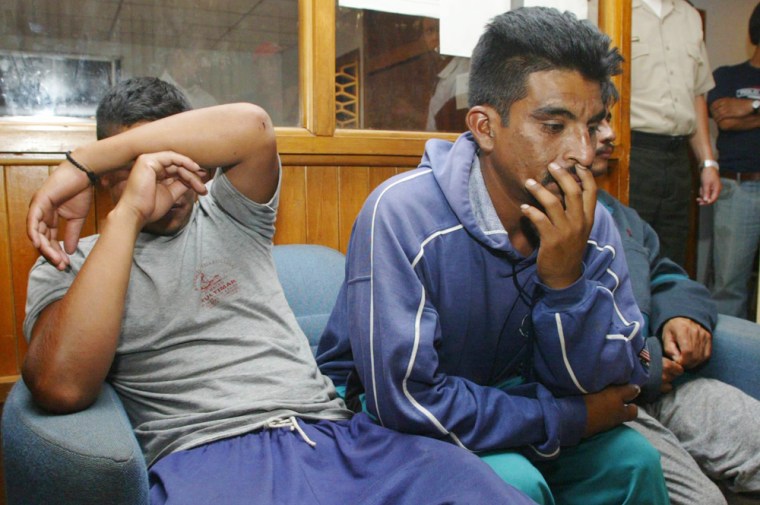Last week, 113 men, women and children boarded a tiny fishing boat with dreams of a new life in the United States. On Thursday, only nine were believed alive after clinging for days to debris in the Pacific Ocean, watching their companions let go — one by one — and slip below the water.
Pedro Diaz, a heavyset 28-year-old farmer, cried bitterly as he recalled the final words of his sister-in-law before she let go of the plastic barrel keeping them afloat.
“Carmen said to me, ‘Save yourself if you can so you can tell this story,”’ he told The Associated Press.
The group assembled before sunrise on Aug. 12 in Esmeraldas, 125 miles north of Manta. The 65-foot fishing boat was built for only 10 people, Ecuador’s navy said, but the smugglers loaded 113 aboard for the journey to Guatemala, expected to last six or seven days.
The passengers then planned to continue north by land from Guatemala, crossing Mexico and entering the United States illegally in search of jobs that paid decent wages. The trip to Guatemala cost them $10,000 apiece, relatives said.
The sky was clear and the water calm when the group set out. But after less than a day at sea, as the boat chugged north under a dark sky off the Colombian coast, a large wave flipped the vessel.
“I was asleep on the deck of the boat,” Diaz said quietly. “Suddenly I felt a wave push the boat to the right and it didn’t reset itself. In seconds, the boat flipped and I had barely enough time to jump into the water.”
He and 12 others grabbed hold of a plastic fuel barrel, bobbing next to the boat in the dark water.
Many trapped below deck
“We all could hear the screams of the people who couldn’t escape from below deck, which was packed full,” he said.
“We heard the screams for a half hour, and still the boat didn’t sink,” he said, his voice falling to a whisper. “Then we couldn’t hear anything and we couldn’t see the boat.”
Julio Sisalema, 25, was clinging to a piece of wood nearby.
“I saw children in the hold — girls, boys — and nobody made it,” he said.
A teenager who survived clinging to the fuel barrel said the hold was locked when the boat sank. Maria Cuzco, 15, her face, arms and back severely burned by the fuel and the sun, described the moment when the boat sank in a heavy sea.
“When we were hit by the giant waves, the people who were in the hold screamed and wept, but they couldn’t get out because it was locked,” Cuzco told Reuters in a police station in the port of Manta where she was helping investigators.
When the sun rose, Diaz said his group spotted three other people struggling to stay afloat, precariously buoyed by plastic water bottles.
The survivors eventually drifted apart, with Diaz among a group of 11 people clinging to the fuel barrel, he said. Over two days in the broiling sun and the choppy waters, people’s strength gave out little by little.
“Of the 11, we were then only five,” he said. “And of the group of five we were only four, the ones that survived.”
Carmen, Diaz’s 27-year-old sister-in-law, was among those who couldn’t keep hold of the plastic barrel.
“You must hold on,” Diaz said she told him before letting go. “Save yourself so you can care for my children.”
Finally, on Sunday morning, an Ecuadorean fishing boat happened on the survivors.
“I felt like I was in heaven when I saw that boat,” Sisalema said.
The fishermen plucked seven men and two women from the ocean. Most of them were in their 20s. One, Rosa Cuzco, was only 15.
The survivors were later transferred to an Ecuadorean coast guard cutter.
Three of the survivors were being treated Thursday for severe sunburns — one with bad burns over 60 percent of her body, according to Eduardo Lopez, director of the burn center at Manta’s public hospital.
Search continues, but little hope survives
The others — including Diaz, still wearing the clothes loaned to him by the fishermen who rescued him — were at an immigration detention center, presumably while authorities ensure all were passengers rather than smugglers.
Ecuadorean Navy Adm. Hector Holguin said the search was continuing for other survivors, in coordination with Colombia and United States. The Colombian navy’s Pacific commander, Adm. Jairo Pena, said more than 100 Colombian sailors in two boats and a navy plane would continue to search for up to four days, and insisted it was still possible survivors might be found.
But Pena told Reuters the chances of finding bodies were minimal in an area where the sea is 1-1/4 miles deep. And relatives of the missing said officials offered them little hope. Diana Eras, 22, whose husband was aboard the boat, chewed on her lips and fought back tears as she waited for news.
“The navy already told us he’s dead,” she said, “that all the others are dead.”
